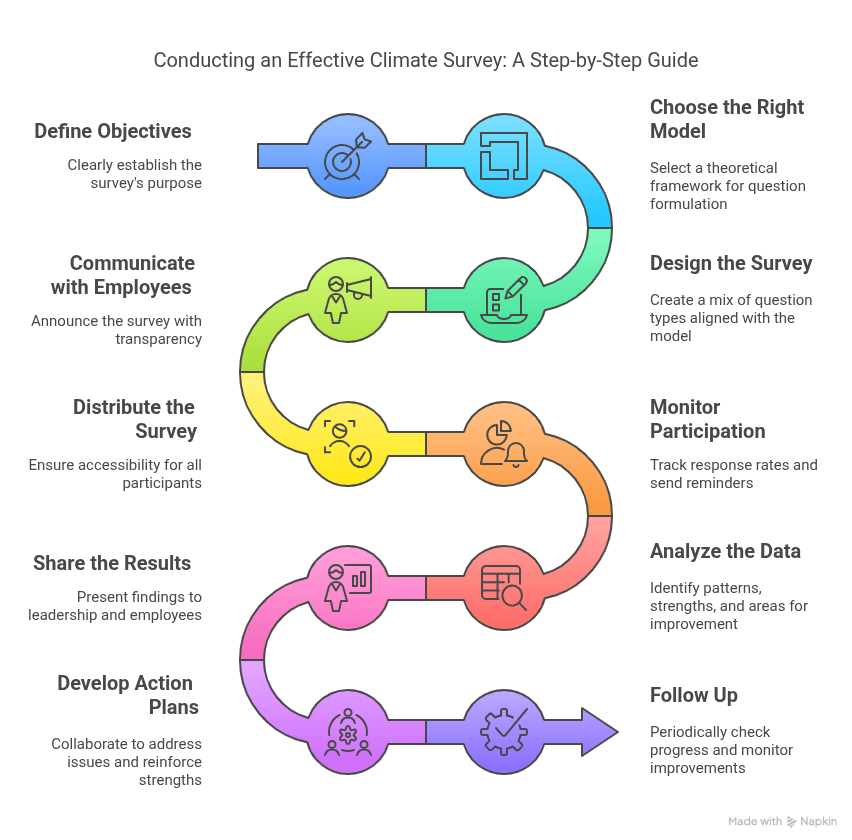How to Conduct an Effective Organizational Climate Survey

Creating an organizational climate survey is a specialized task best handled by experienced Human Resources professionals. These surveys play a critical role in assessing how employees perceive their work environment and the conditions provided by the organization to support their performance and motivation.
Organizational climate reflects the collective perception employees have about their workplace—how it enables them to perform at their best. When a company decides to evaluate its internal atmosphere, the first step is typically to conduct a well-structured survey. This requires careful planning and well-crafted questions to gather meaningful insights.
Because of its complexity and significance, there are three well-established models for designing climate surveys. Before diving into sample questions, let’s explore these foundational approaches in greater detail.
Key Models for Structuring an Organizational Climate Survey
1. Litwin and Stringer Model: 9 Core Dimensions of Climate
Developed by George Litwin and Robert Stringer in the 1960s at Harvard Business School, this model is considered a pioneering framework in organizational behavior studies. It identifies nine critical dimensions that influence how employees perceive their work environment:
- Structure: Measures how formalized the roles, rules, and hierarchy are within the company. A rigid structure may create barriers, while a more flexible structure may promote innovation and comfort.
- Responsibility: Assesses how much autonomy and accountability employees feel in their roles. High responsibility usually correlates with empowerment and ownership.
- Challenge: Evaluates whether employees feel stretched in their roles, encouraging growth and innovation—or conversely, overwhelmed or under-stimulated.
- Reward: Looks at how performance is recognized and rewarded. It includes financial incentives, promotions, and public acknowledgment.
- Relationships: Measures interpersonal dynamics and the presence of mutual respect, trust, and camaraderie.
- Cooperation: Evaluates the extent of collaboration across departments and teams, and whether silos or competition hinder collective performance.
- Conflict: Investigates how open the organization is to dissent and diverse viewpoints, and how effectively conflicts are managed.
- Identity: Measures whether employees feel a sense of belonging and alignment with the company’s mission and values.
- Standards: Looks at performance expectations and whether there’s a culture of excellence or mediocrity.
This model emphasizes that leadership and culture significantly shape these dimensions, and its application helps organizations identify specific areas to improve employee engagement and productivity.
2. Kolb Model: Emphasis on Emotional Climate and Clarity
David Kolb, known for his work on experiential learning, extended the Litwin and Stringer framework by adding a more affective and psychological layer to the assessment. His model retains Responsibility, Standards, and Reward while adding the following key dimensions:
- Conformity: Examines the extent to which employees are pressured to comply with external rules or directives, potentially stifling creativity or initiative.
- Organizational Clarity: Assesses how clearly employees understand the organization’s vision, goals, and how their work contributes to them.
- Warmth and Support: Captures the emotional atmosphere of the workplace—whether employees feel supported and valued by peers and leaders.
- Leadership: Looks at whether leadership inspires confidence, provides direction, and garners voluntary support from staff.
This model is particularly useful for organizations that want to assess not just structural and procedural factors, but also the psychological and emotional safety of their teams. It’s often used in organizations with flat hierarchies or in change management contexts.
3. Sbragia Model: A Comprehensive and Diagnostic Approach
Developed by R. Sbragia and collaborators in Brazil, this model synthesizes elements from both Litwin-Stringer and Kolb, while significantly expanding the list of factors to cover a broader spectrum of organizational dynamics. It includes the original factors Structure, Standards, Reward, Cooperation, Conflicts, Conformity, and Identity, and adds 13 more dimensions:
- State of Tension: Evaluates emotional strain in the workplace, balancing logic and emotion in interactions and decisions.
- Focus on Participation: Measures how involved employees are in the company’s decisions, strategy, and innovation efforts.
- Supervisory Proximity: Assesses the accessibility and involvement of supervisors in day-to-day operations.
- Human Consideration: Looks at whether the company genuinely values employees beyond their output—recognizing them as people, not just resources.
- Autonomy Present: Gauges the extent to which individuals can make decisions in their roles without constant approval.
- Prestige Obtained: Reflects the pride employees feel in working for the organization and how the company is perceived externally.
- Existing Tolerance: Assesses how the company deals with mistakes—whether errors are seen as learning opportunities or punished harshly.
- Perceived Clarity: Measures how clearly goals, roles, and expectations are communicated.
- Predominant Justice: Evaluates fairness in decision-making, promotions, and conflict resolution.
- Progress Conditions: Examines whether employees believe the company supports their career growth.
- Logistical Support: Assesses whether employees have the tools, systems, and infrastructure they need to work effectively.
- Recognition Provided: Looks at how outstanding work is acknowledged and rewarded.
- Form of Control: Investigates the balance between freedom and oversight—how performance is monitored, and whether control methods are transparent and fair.
📌 Tip: Many of the control-related dimensions in the Sbragia model can be supported through digital tools like BPM systems, which make performance expectations, results, and workflows transparent and easier to manage.
How to Conduct the Survey: Key Steps
Conducting an organizational climate survey involves more than distributing a questionnaire. Here’s a step-by-step process to ensure your survey is effective and meaningful:
- Define Objectives: Clearly establish the purpose of the survey. Are you looking to identify improvement areas, assess morale, or evaluate management effectiveness?
- Choose the Right Model: Select a theoretical framework (Litwin and Stringer, Kolb, or Sbragia) to guide your question formulation.
- Design the Survey: Use a mix of closed and open-ended questions aligned with your chosen model. Ensure clarity and neutrality to avoid biased responses.
- Communicate with Employees: Announce the survey with transparency. Emphasize confidentiality, the value of honest feedback, and how the data will be used.
- Distribute the Survey: Use digital tools or printed forms as appropriate. Ensure accessibility for all participants.
- Monitor Participation: Track response rates. Send reminders if necessary and extend the deadline if needed to ensure good coverage.
- Analyze the Data: Organize responses by category. Use statistical and qualitative analysis to identify patterns, strengths, and areas for improvement.
- Share the Results: Present findings to both leadership and employees. Be transparent about what was learned.
- Develop Action Plans: Collaborate with department heads and team leaders to address issues and reinforce strengths.
- Follow Up: Periodically check progress and consider running pulse surveys to monitor improvements over time.

25 Sample Questions for an Organizational Climate Survey
Once you choose a model, the next step is tailoring questions to each dimension. Below is a list of 25 illustrative questions drawn from various categories:
- Do you receive all the information needed to perform your tasks effectively?
- Do you believe there are real opportunities for career advancement here?
- Are your ideas and suggestions welcomed for improving work processes?
- Does your job allow you to continuously learn and grow?
- Do your supervisors provide clear instructions that help you complete your tasks?
- Do managers support your learning and development efforts?
- Are training opportunities equally accessible to all employees?
- Do you feel motivated by your career prospects in this organization?
- Is the work environment conducive to healthy relationships?
- Do colleagues readily help one another?
- Do you trust your team members?
- Would you say relationships among employees are generally positive?
- When you ask for help, do coworkers respond quickly?
- Is knowledge shared openly among your peers?
- Are employees encouraged to take part in decisions?
- Is your daily work schedule sufficient to meet your responsibilities?
- Would you be interested in taking on more senior responsibilities?
- Are you generally happy with your job?
- Do you feel your role is essential to the company’s success?
- Does working here improve your overall quality of life?
- Do you feel your job provides stability and security for you and your family?
- Are you proud to work for this company? Would you recommend it to friends or family?
- Do you leave work feeling professionally fulfilled?
- Are the company's goals and mission clear to you?
- Do you believe the products or services your company offers benefit society?
Example of an Action Plan Based on Survey Results
Once you've analyzed the results of your organizational climate survey, the next step is to implement targeted improvements. Here's an example of a simplified action plan:
Scenario: Survey reveals low scores in "Recognition Provided" and "Career Advancement Opportunities."
Objective: Improve employee recognition and establish transparent career development paths.
Action Steps:
- Recognition Program Launch:
- Create monthly “Employee Spotlight” recognitions.
- Introduce peer-nominated awards.
- Communicate achievements via internal newsletters and company-wide meetings.
- Career Development Framework:
- Define role progression and criteria for advancement.
- Launch mentoring and coaching programs.
- Conduct quarterly development check-ins with managers.
- Ownership and Responsibility:
- HR to lead program implementation.
- Managers to actively participate in mentoring and recognition.
- Timeline:
- Begin rollout within 30 days.
- Evaluate impact after 3 months with a pulse survey.
- Expected Outcomes:
- Improved satisfaction scores in future surveys.
- Higher employee retention and internal promotion rates.
Suggested Indicators to Monitor Progress
To ensure that improvements based on the climate survey are effective, it's important to monitor progress over time using relevant indicators. Here are some suggested Key Performance Indicators (KPIs):
- Employee Engagement Score
- Derived from follow-up surveys or pulse checks.
- Measures general satisfaction, motivation, and connection with the company.
- Turnover Rate
- Indicates retention levels and potential dissatisfaction.
- Should be monitored across departments for patterns.
- Internal Promotion Rate
- Tracks how often positions are filled internally, reflecting career development effectiveness.
- Participation Rate in Surveys
- Indicates trust in leadership and willingness to provide feedback.
- High participation reflects a strong communication culture.
- Training Completion Rate
- Monitors engagement in learning and development initiatives.
- Recognition Frequency
- Number of recognitions issued through formal programs.
- Shows whether initiatives to increase acknowledgment are being executed.
- Pulse Survey Scores on Target Areas
- Short surveys focused on specific areas identified in the initial climate survey (e.g., leadership, communication).
- Manager Feedback Quality
- Evaluates whether employees are receiving helpful, consistent guidance.
- Can be collected through specific survey items or 1-on-1 reviews.
- Absenteeism Rate
- High or growing absenteeism can signal disengagement or dissatisfaction.
- Net Promoter Score (eNPS)
- Asks employees how likely they are to recommend the company as a place to work.
- A strong indicator of overall satisfaction.
🎥 Watch our quick explainer video on Net Promoter Score (eNPS) to understand how it measures employee loyalty and drives culture improvements.

Final Thoughts
These examples are a starting point. An effective organizational climate survey should reflect the reality, goals, and structure of your organization. For accurate results, surveys should be designed and analyzed by trained professionals or external specialists who understand organizational behavior.
By selecting the right model and carefully crafting survey questions, companies can uncover valuable insights that help enhance employee engagement, drive performance, and cultivate a positive workplace culture.
